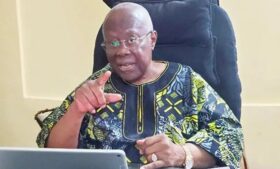The recent defection of prominent figures like former Vice President Atiku Abubakar and ex-Senate President David Mark from the Peoples Democratic Party (PDP) to the African Democratic Congress (ADC)-led coalition has sparked outrage and disappointment within the PDP, particularly from its founding members. Chief Bode George, a veteran PDP leader, has vehemently criticized this exodus, labeling it a betrayal of the party’s legacy and a weakening of the opposition force in Nigeria. He argues that their actions, fueled by personal ambition and a lack of commitment to resolving internal party disputes, will ultimately undermine the PDP’s ability to effectively challenge the ruling party. George emphasizes the importance of loyalty and working within the party to address challenges, rather than abandoning it in pursuit of individual aspirations.
George’s criticism centers on the perceived hypocrisy of Atiku and Mark, who he claims were instrumental in creating the very crisis they now cite as justification for their departure. He points specifically to the 2022 PDP presidential primary, where he alleges both men orchestrated events that led to division within the party by pushing for another northern presidential candidate despite the completion of former President Buhari’s eight-year term. This disregard for the party’s internal dynamics, in George’s view, laid the groundwork for the current turmoil. He questions their motives, suggesting that personal ambition and a desire for power outweigh any genuine concern for the party’s well-being or the nation’s political landscape.
The ADC-led coalition, touted as a “mega opposition force,” has been met with skepticism by George, who dismisses its strategy as lacking substance and driven by “existential imbecility.” He questions the coalition’s ability to replicate the PDP’s established network and influence, emphasizing the PDP’s long-standing presence in Nigerian politics and its role in fostering democratic principles. George argues that the coalition’s formation is based on opportunistic alliances rather than a shared vision or coherent political ideology. This, he believes, will ultimately hinder its ability to effectively challenge the ruling party and offer a viable alternative to the electorate.
Furthermore, George challenges the defectors’ rationale for abandoning the PDP. He argues that internal disputes are a natural part of any political party and should be addressed through internal mechanisms rather than through defection. He emphasizes the importance of loyalty and commitment to the party’s foundational principles, highlighting the PDP’s historical significance in Nigerian politics. George draws an analogy to a family home, suggesting that leaving the party during a period of crisis is akin to abandoning one’s family when faced with challenges. He advocates for staying within the party and working towards its revitalization rather than seeking refuge in a hastily formed coalition.
Despite his evident disappointment and frustration, George maintains an optimistic outlook for the PDP’s future. He emphasizes the party’s resilience and its ability to engage in robust internal debate as key strengths. He believes that the PDP possesses the necessary infrastructure and intellectual capacity to overcome its current challenges and emerge as a stronger, more unified force. George’s faith in the PDP’s ability to weather this storm stems from his deep-rooted belief in the party’s foundational principles and its enduring legacy in Nigerian politics. He believes the party’s history of democratic engagement and internal deliberation provides a solid foundation for future growth and success.
In conclusion, Chief Bode George’s strong condemnation of Atiku Abubakar and David Mark’s defection to the ADC-led coalition reflects a deep concern for the future of the PDP and the broader Nigerian political landscape. He views their actions as a betrayal of the party’s legacy and a weakening of the opposition’s ability to hold the ruling party accountable. While acknowledging the internal challenges faced by the PDP, he advocates for internal resolution and emphasizes the importance of loyalty and commitment to the party’s foundational principles. Despite his disappointment, George remains optimistic about the PDP’s ability to overcome its current difficulties and emerge as a stronger, more unified force in Nigerian politics. He believes in the party’s inherent resilience and its capacity for internal reform, which he sees as crucial for its long-term survival and success.


